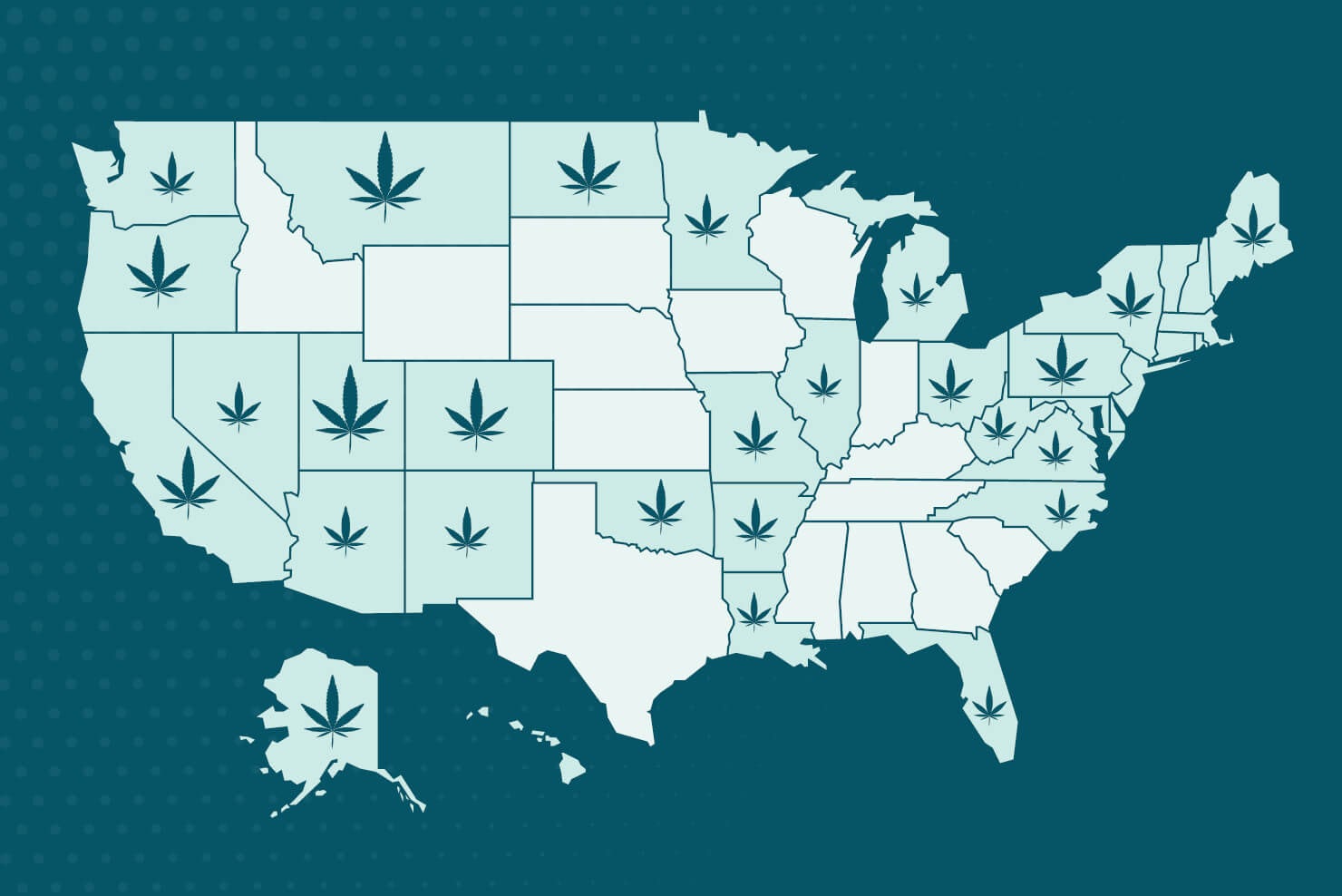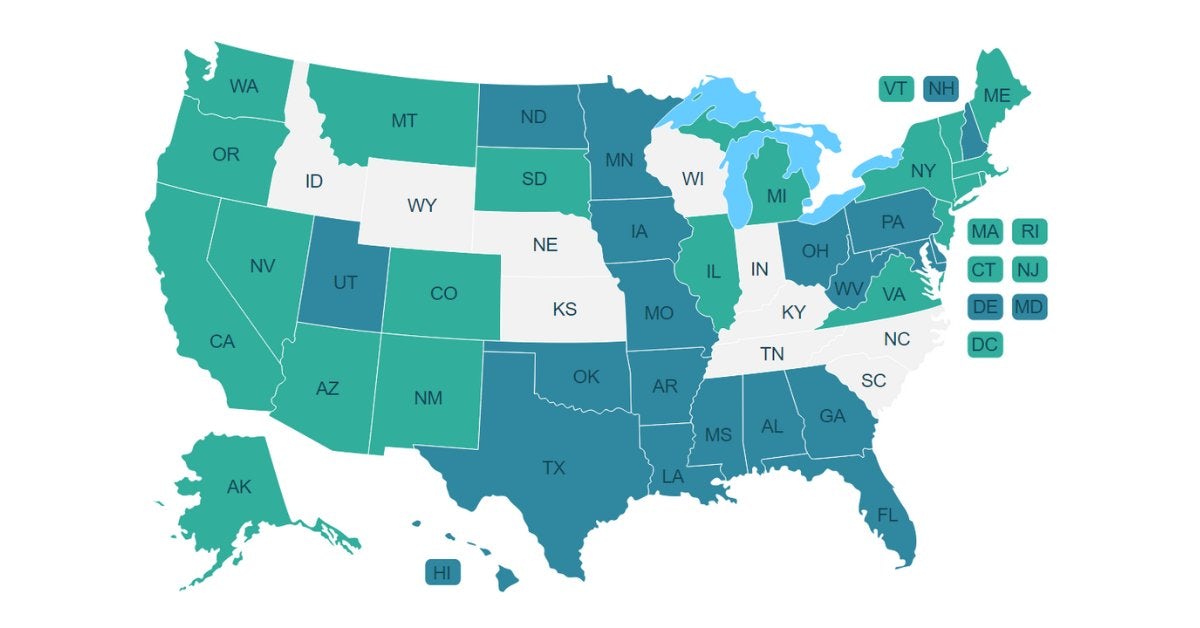Medical: Yes
Recreational: Legal
Reciprocity: No
Pennsylvania’s medical marijuana program was legalized in April 2016 and became available to patients in February 2018. The law allows medical recipients to purchase cannabis products in pill, oil, tincture, or topical form, as well as cannabis flower and vaping products.
How to Get a Medical Card in Pennsylvania
1. Register online with the PA Department of Health
Go to this address and fill out the form with your personal details.
2. Visit a healthcare professional
After registering online, visit an approved medical practitioner who can certify that you have one of the qualifying health conditions (see list below). Prospective caretakers must also apply online, and go through a criminal background check.
3. Pay fee online
After receiving certification from an approved physician, you must return to the medical marijuana registration and complete the application and pay the $50 registration fee. If ordered online, the card should take between 7 to 10 days to arrive by mail, after which you can take it to an approved medical marijuana dispensary in Philadelphia.
Where to buy medical marijuana in Pennsylvania
Medical cannabis patients can purchase products at dozens of dispensaries across the state. The Pennsylvania Department of Health lists around 100 authorized medical cannabis dispensaries across the commonwealth that currently have cannabis in stock. The dispensaries are most heavily concentrated in the state’s two largest cities, Philadelphia and Pittsburgh, though they can be found across the interior of the state, from Erie to Brookville to Johnstown to Scranton and smaller towns and cities in between.
Some of the highest-rated medical cannabis dispensaries in Pennsylvania on Yelp include:
- Restore Integrative Wellness Center (#1 in Philadelphia)
- Ethos Dispensary (#2 in Philadelphia)
- Nature’s Way Medicine (#3 in Philadelphia)
- Maitri Medicinals (#1 in Pittsburgh)
- Ethos Dispensary – Pittsburgh West (#2 in Pittsburgh)
- Solevo Wellness (#3 in Pittsburgh)
- Columbia Care (#1 in Scranton)
- Organic Remedies (#1 in Harrisburg)
- Columbia Care (#1 in Allentown)
- Rise Dispensaries (#1 in Erie)
Qualifying Conditions
In Pennsylvania, an applicant may receive medical marijuana if they (or the person they are providing caregiver services for) has one or more of the following conditions:
- Amyotrophic lateral sclerosis
- Anxiety disorders
- Autism
- Cancer, including remission therapy
- Crohn’s disease
- Damage to the nervous tissue of the central nervous system (brain-spinal cord) with the objective neurological indication of intractable spasticity, and other associated neuropathies
- Dyskinetic and spastic movement disorders
- Epilepsy
- Glaucoma
- HIV / AIDS
- Huntington’s disease
- Inflammatory bowel disease
- Intractable seizures
- Multiple sclerosis
- Neurodegenerative diseases
- Neuropathies
- Opioid use disorder for which conventional therapeutic interventions are contraindicated or ineffective, or for which adjunctive therapy is indicated in combination with primary therapeutic interventions
- Parkinson’s disease
- Post-traumatic stress disorder
- Severe chronic or intractable pain of neuropathic origin or severe chronic or intractable pain
- Sickle cell anemia
- Terminal illness
- Tourette syndrome
Can you buy Marijuana in Pennsylvania with an out-of-state medical card?
Any applicant for the medical marijuana program must have proof of Pennsylvania residency, either the form of a driver’s license or state issued ID card. Pennsylvania does not allow medical marijuana patients to purchase cannabis from dispensaries with an out-of-state medical cannabis card.
Pennsylvania law did allow parents or guardians to purchase cannabis from another state for a patient under the age of 18, but this measure has since expired.
What is the punishment for possession of cannabis in Pennsylvania?
Though Pennsylvania did legalize medical marijuana law in 2016, it has fallen behind neighboring states like New Jersey or New York when it comes to cannabis legalization.
Pennsylvania marijuana laws are quite strict, and possession of any amount of cannabis is a criminal offense, and no form of cultivation is legal, even if a patient is growing for personal use.
At the same time, some municipalities like Philadelphia have passed local ordinances decriminalizing possession of small amounts of cannabis for personal use.
Cannabis offenses in Pennsylvania can carry the following penalties:
| Offense | Penalty |
| Possession – 30 grams or less (misdemeanor) | 30 days imprisonment and/or up to $500 fine |
| Possession – more than 30 grams (misdemeanor) | 1 year imprisonment and/or up to $5,000 fine |
| Sale or distribution – 30 grams or less (misdemeanor) | 30 days imprisonment and/or up to $500 fine |
| Sale or distribution – more than 30 grams (felony) | 2.5-5 years imprisonment and/or $15,000 fine |
| Cultivation – any number of plants (felony) | 2.5-5 years imprisonment and/or $15,000 fine |
| Possession of concentrates or hash – 8 grams or less (misdemeanor) | 30 days imprisonment and/or up to $500 fine |
| Possession of concentrates or hash – 8 grams or more (misdemeanor) | 1 year imprisonment and/or up to $5,000 fine |
| Manufacture of concentrates (felony) | 2.5-5 years imprisonment and/or $15,000 fine |
| Possession or sale of paraphernalia (misdemeanor) | 6-12 months imprisonment and/or $2,500 fine |
The state also has mandatory minimum penalties for specific marijuana offenses. For instance, according to the Pennsylvania Consolidated Statutes, there is a mandatory minimum sentence of one year in prison and a fine of $5,000 if a person is convicted of a marijuana offense that involves more than 2 pounds but less than 10 pounds of cannabis, or more than 10 live plants but less than 21. If the amount of cannabis is more than 10 pounds but less than 50, or more than 21 plants but less than 50, then the penalties are three years in prison and a fine of $15,000. Once the amount passes 50 pounds or 50 live plants, the mandatory penalty becomes 5 years in prison and a fine of $50,000.
Pennsylvania also has a zero tolerance policy regarding driving under the influence of drugs, including cannabis.
Growing cannabis in Pennsylvania (legally)
Pennsylvania’s medical marijuana program does not allow patients to legally cultivate the plant for personal use, and they can face stiff penalties if prosecuted.
To become an approved cannabis cultivator in Pennsylvania, one must first obtain approval from the Pennsylvania Department of Health. According to the department’s guidelines, there can be only 25 cultivation permits issued at any given time. To receive approval, an applicant must meet a wide array of requirements, including, to show the ability to maintain security, compliance with zoning requirements, and a diversity plan, among others. They must also submit a non-refundable initial fee of $10,000 and a permit fee of $200,000 (refundable if permit is not granted). They must also prove that they have $2 million in capital. If awarded a permit, they must also complete a two-hour training course.
Taxes and Medical Marijuana in Pennsylvania
The sale of marijuana is not subject to sales tax in Pennsylvania. The state charges a 5% tax on the gross receipts of sales of medical marijuana by growers/processors to dispensaries.
Sign up for bi-weekly updates, packed full of cannabis education, recipes, and tips. Your inbox will love it.

 Shop
Shop Support
Support













